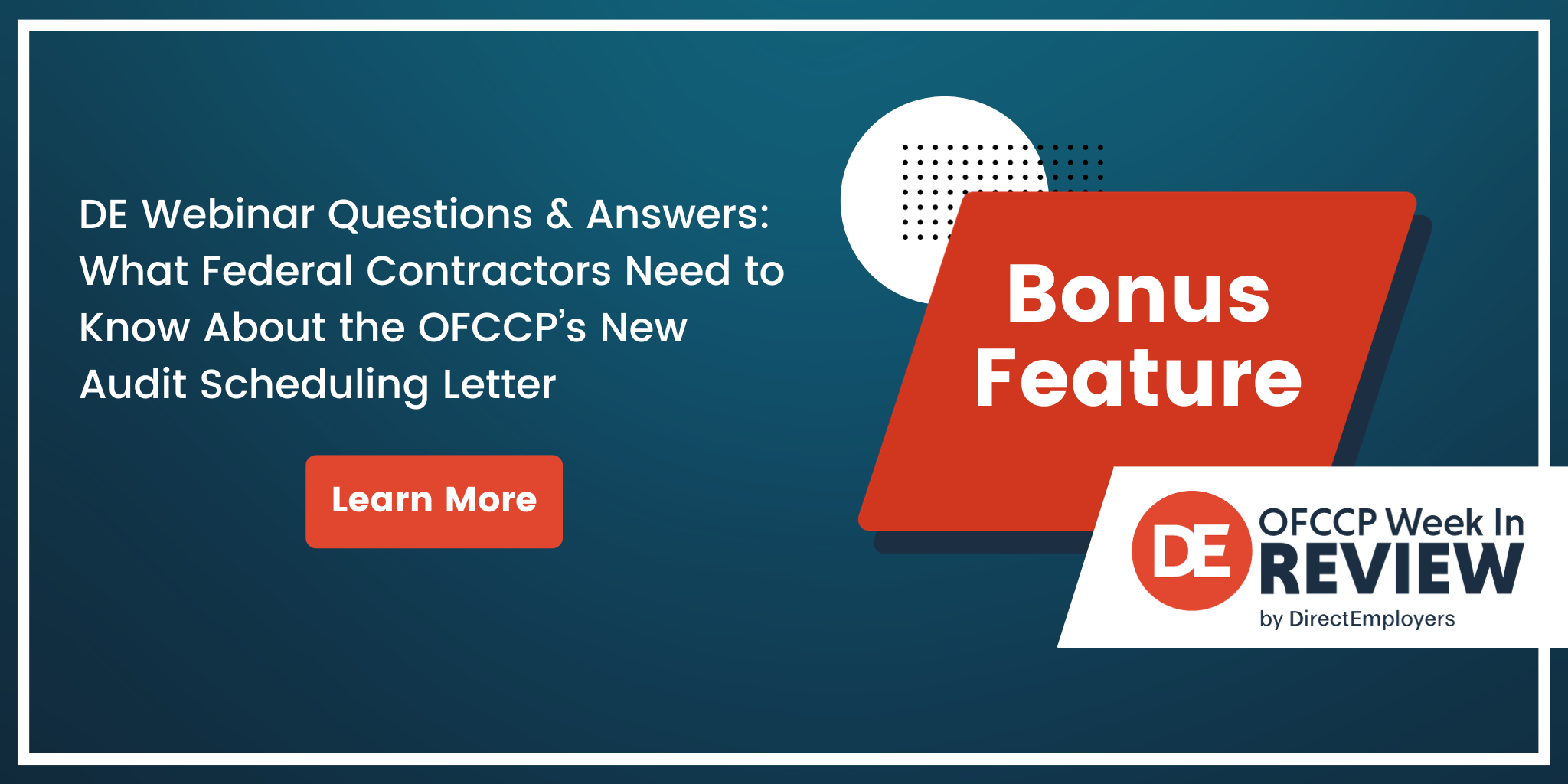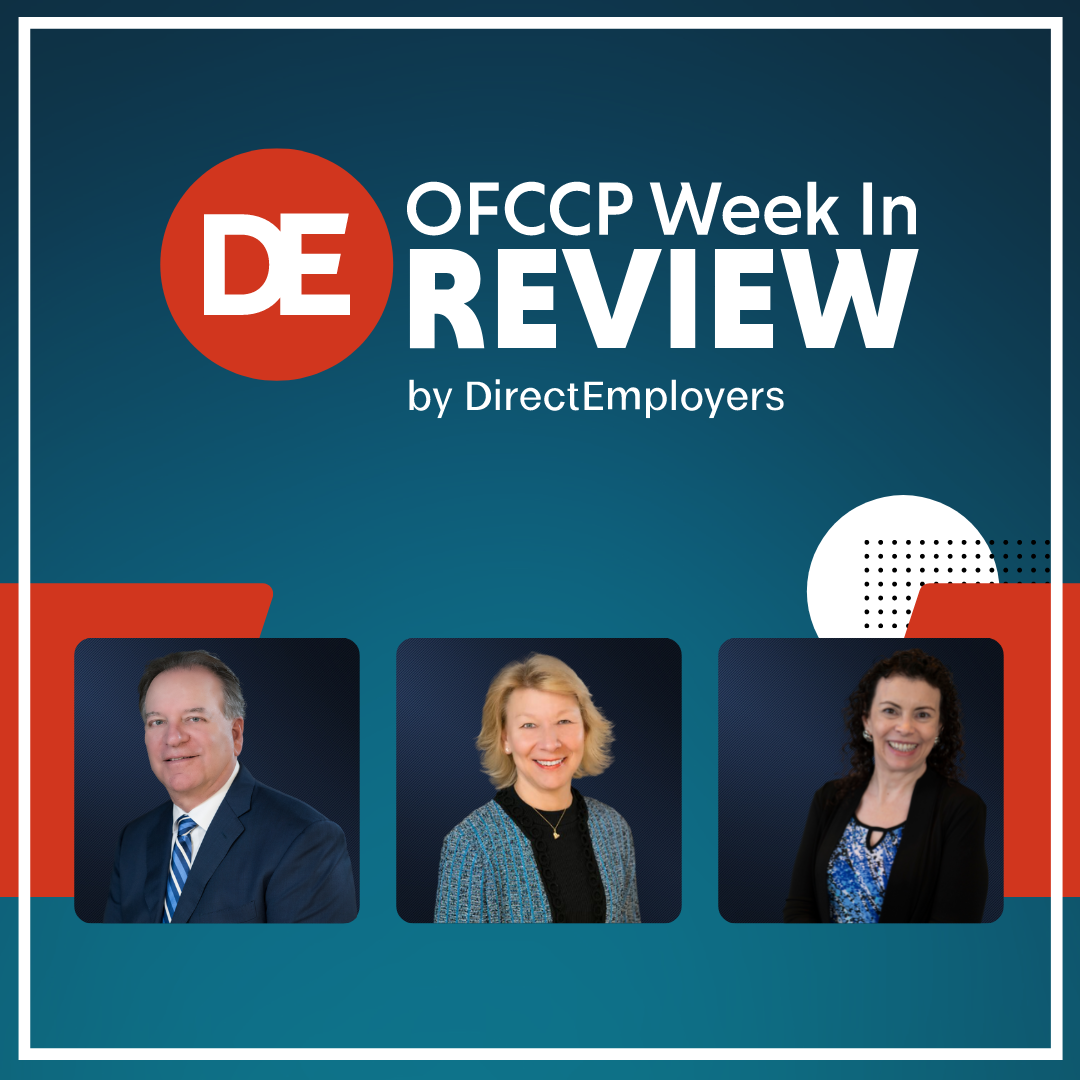 The DE OFCCP Week in Review (WIR) is a simple, fast and direct summary of relevant happenings in the OFCCP regulatory environment, authored by experts John C. Fox, Candee J. Chambers and Cynthia L. Hackerott. In today’s edition, they discuss:
The DE OFCCP Week in Review (WIR) is a simple, fast and direct summary of relevant happenings in the OFCCP regulatory environment, authored by experts John C. Fox, Candee J. Chambers and Cynthia L. Hackerott. In today’s edition, they discuss:
- Remote Work Not Required to Accommodate Hospital Worker’s Disability Claims Because Physical Presence was Essential Job Function
- U.S. EEOC Settled with Tutoring Company that had Alleged Intentionally Programmed its ATS to Reject Older Applicants
- 2022 EEO-1 Component 1 Data File Upload Specifications Posted
- DE Webinar Questions & Answers: What Federal Contractors Need to Know About the OFCCP’s New Audit Scheduling Letter
- In Brief
- Looking Ahead: Upcoming Date Reminders
Monday, August 7, 2023: Remote Work Not Required to Accommodate Hospital Worker’s Disability Claims Because Physical Presence was Essential Job Function
Exemption from On-Site Facial Covering Mandate Not a Reasonable Accommodation
 A lower court correctly dismissed an Indiana hospital department head’s disability accommodation, discrimination, and related claims, the U.S. Seventh Circuit Court of Appeals (Chicago) ruled. The Court found that manager Anna Kinney could not perform certain essential functions of her job without being present in the radiology department she oversaw (Kinney v. St. Mary’s Health, Inc., No. 22-2740). Ms. Kinney requested she be allowed to work from home, claiming that she could not comply with the hospital’s COVID-19 safety protocol requiring her to wear face coverings which exacerbated her pre-existing anxiety disability.
A lower court correctly dismissed an Indiana hospital department head’s disability accommodation, discrimination, and related claims, the U.S. Seventh Circuit Court of Appeals (Chicago) ruled. The Court found that manager Anna Kinney could not perform certain essential functions of her job without being present in the radiology department she oversaw (Kinney v. St. Mary’s Health, Inc., No. 22-2740). Ms. Kinney requested she be allowed to work from home, claiming that she could not comply with the hospital’s COVID-19 safety protocol requiring her to wear face coverings which exacerbated her pre-existing anxiety disability.
Writing for a unanimous three-judge panel, Judge David F. Hamilton concluded that because physical presence was an “essential function” of her job, she was not “qualified” for her manager position under the Americans with Disabilities Act (“ADA”). Moreover, even if she had been “qualified,” the accommodation she requested – to be excused from the safety protocol and work without a face covering – was not reasonable. The fact that the hospital allowed her to work from home for several months during the pandemic did not sway the appellate court to rule otherwise.
Employee Worked Remotely for Six Months During Pandemic
As the Executive Director of the radiology department, Ms. Kinney supervised approximately 120 employees. For six months during the COVID-19 pandemic, she worked remotely, going to the hospital two or three times a month. When the hospital developed safety protocols in August 2020, her coworkers, including all department heads, returned to work in person at the hospital and wore facial masks/coverings as per the hospital’s requirements at the time. Nevertheless, she completely stopped going on-site and worked solely from home yet did not bother to tell her supervisor or ask permission.
Hospital Rejected Accommodation Requests & Employee Eventually Resigned
In October, following multiple complaints about her failure to appear on-site, her supervisor told Ms. Kinney that she needed to work in person at least a few times each week. A few days later she submitted a doctor’s note saying that she could not wear a mask due to her diagnosed anxiety disorder (which the hospital accommodated with intermittent Family and Medical Leave Act (“FMLA”) leave prior to the pandemic). Ms. Kinney’s “Doctor Note” recommended that she work entirely from home, if possible. Although the hospital suggested wearing a face shield instead of a mask, Ms. Kinney failed to respond as to whether that suggestion was feasible. The hospital then required Ms. Kinney to return to work in person effective December 27, 2020.
In January 2021, Ms. Kinney submitted a second doctor’s note requesting an alternative accommodation of allowing for in-person work two days a week for six hours each day while performing as many of her responsibilities as possible in her office using remote technology so that mask-wearing could be kept to a minimum. Even then, Ms. Kinney’s doctor recommended that the hospital not require her to wear a mask for more than 15 minutes at a time. However, the hospital denied this request. The next week, Ms. Kinney attended an in-person staff meeting without a mask, leading to a reprimand. From that point, she worked in person two days a week, spending most of her time in her office with her door closed and without a mask. She took intermittent FMLA leave and used accrued paid time off to cover the remaining three workdays each week. When Ms. Kinney’s paid time off ran out, she took a leave of absence before finally resigning in August 2021.
Looking at Specific Job Functions, Appellate Court Found Physical Presence Essential
The Seventh Circuit panel ruled that Ms. Kinney’s requested accommodation of working remotely was not feasible because uncontested testimony from her managers, coworkers, and subordinates showed that she could not perform the essential functions of her job satisfactorily while doing so. Among other functions, her job description required her to monitor the plan for patient care services, oversee the installation and maintenance of equipment, serve as a liaison to other departments, and evaluate employee performance. Even though she asserted she could do such tasks remotely, the court pointed out that she had to rely on reports from others to fulfill several of her responsibilities. On top of that, several of Ms. Kinney’s subordinates complained that her absence impaired department morale and efficiency,
In addition, Ms. Kinney did not dispute that the hospital’s at-issue safety protocol was a valid job requirement. Indeed, her job description contained a requirement of “using personal protective equipment as required.” Moreover, Ms. Kinney did not suggest that there was a reasonable alternative face covering that would allow her to achieve the purpose of the safety requirements.
“The fact that many employees were able to work remotely temporarily when forced to do so by a global health crisis does not mean that those jobs do not have essential functions that require in-person work over the medium to long term,” Judge Hamilton wrote. “Determining whether a specific job has essential functions that require in-person work has become much more of a case-specific inquiry,” he added.
The Seventh Circuit panel also affirmed the U.S. District Court for the Southern District of Indiana’s dismissal of her related Title VII and FMLA claims.
Monday, September 11, 2023: U.S. EEOC Settled with Tutoring Company that had Alleged Intentionally Programmed its ATS to Reject Older Applicants
This Previously Touted First-ever “AI” Lawsuit was not an AI Case at All

The EEOC alleged that iTutorGroup violated the Age Discrimination in Employment Act when it intentionally programmed its tutor application software to automatically reject female applicants aged 55 or older and male applicants aged 60 or older. As a result, iTutorGroup rejected more than 200 qualified applicants based in the United States because of their age. Last month we reported that the EEOC filed a Notice of Settlement and a Proposed Consent Decree with the federal court district court for the Eastern District of New York. Following U.S. District Judge Pamela K. Chen’s approval of the settlement on September 8, the EEOC announced it in a press release on Monday.
Although iTutorGroup has ceased hiring tutors in the United States, the agreement also provides for non-monetary relief should iTutorGroup ever resume its U.S. operations. That relief includes:
- extensive and continuing training for those involved in hiring tutors,
- iTutorGroup issuing a “robust” new anti-discrimination policy, and
- “strong injunctions against discriminatory hiring based on age or sex and requesting applicants’ birth dates.”
Further, the EEOC will monitor iTutorGroup’s compliance with these obligations for at least the next five years or longer if the integrated companies resume hiring tutors in the United States. Plus, should iTutorGroup resume its U.S. operations, it must notify and interview those applicants allegedly rejected because of age.
EEOC Previously Touted Lawsuit as Alleging Unlawful Use of AI
In Monday’s press statement, the EEOC did not characterize the lawsuit as one involving the use of artificial intelligence (“AI”). Indeed, it made no mention of AI at all. Yet, the agency explicitly focused on AI in the press release announcing the lawsuit back in May 2022, which stated:
“Age discrimination is unjust and unlawful. Even when technology automates the discrimination, the employer is still responsible,” said EEOC Chair Charlotte A. Burrows. “This case is an example of why the EEOC recently launched an Artificial Intelligence and Algorithmic Fairness Initiative. Workers facing discrimination from an employer’s use of technology can count on the EEOC to seek remedies.”
…
“The agency recently launched an Artificial Intelligence and Algorithmic Fairness Initiative to ensure that the use of software, including artificial intelligence (AI), machine learning, and other emerging technologies used in hiring and other employment decisions comply with the federal civil rights laws that the EEOC enforces.”
Thus, widespread, previous reporting had characterized the agency’s court action as “alleging AI hiring discrimination.” However, as John Fox pointed out in our “DE Under 3” video discussing our report last month, this case does not involve AI. Rather, it simply demonstrates an adjustment to an existing applicant tracking software system, where the integrated companies intentionally went in and changed their software. “This has nothing to do with unique algorithms that are going in and analyzing data and drawing a conclusion in an artificial way. This was purposeful, specific, targeted, unlawful discrimination,” he noted.
Nevertheless, this case is a good teaching example because this type of discriminatory software programming is “a growing issue,” Fox explained. Companies need to train their managers about it, especially managers outside the United States who may not understand that U.S. law prohibits certain types of discrimination that are perfectly lawful and accepted in other countries, he added.
Wednesday, September 13, 2023: 2022 EEO-1 Component 1 Data File Upload Specifications Posted

“The EEOC requires electronic submission of EEO-1 Component 1 report(s) through a web-based data collection application (i.e., portal) referred to as the EEO-1 Component 1 Online Filing System (OFS). Filers must submit workforce demographic data electronically in the web-based portal (i.e., OFS) through either (1) manual data entry or (2) data file upload. The “manual data entry” option requires directly entering workforce demographic data into the OFS. The “data file upload” option requires uploading a data file using the 2022 EEO-1 Component 1 Data File Upload Specifications.
Filers choosing the “data file upload” option should read the newly updated 2022 EEO-1 Component 1 Instruction Booklet prior to and in conjunction with the 2022 EEO-1 Component 1 Data File Upload Specifications (i.e., “Data File Upload Specifications”). Filers must ensure they are complying with the EEOC’s substantive filing requirements detailed in the Instruction Booklet and should not refer solely to the “Data File Upload Specifications” to complete their required 2022 EEO-1 Component 1 filing.”
We reported earlier that the EEOC set October 31 as the Opening Date for its 2022 EEO-1 Survey Component 1 Data Collection with the filing deadline on December 5, 2023. Last week, the agency posted the 2022 EEO-1 Component 1 Instruction Booklet.
Wednesday, September 13, 2023: DE Webinar Questions & Answers: What Federal Contractors Need to Know About the OFCCP’s New Audit Scheduling Letter
DirectEmployers held a complimentary 90-minute fast-paced Webinar for the public and its Member Companies discussing OFCCP’s new and controversial audit Scheduling Letter for Supply & Service contractors. Because many of the questions the attendees posed during the Webinar offered excellent “teaching opportunities” about OFCCP compliance topics, our Week in Review Editor and Publisher, Candee J. Chambers, made the command decision to publish 18 of these Questions and the Answers we composed in response after the Webinar. Here are the Questions as DE received them during the Webinar and our Answers to the questions.
Key Acronyms
- OMB = White House Office of Management and Budget
- CSAL = Corporate Scheduling Announcement List
- FAAPs = Functional Affirmative Action Programs
Q1: Does the new scheduling letter apply to the previous CSAL List?
A1: Yes, the new OFCCP audit Scheduling Letter will apply to ALL audits OFCCP announced on its previous CSAL list for which OFCCP has not yet issued an audit…
In Brief
Monday, September 11, 2023: Wilcox Sworn-In for Second NLRB Term
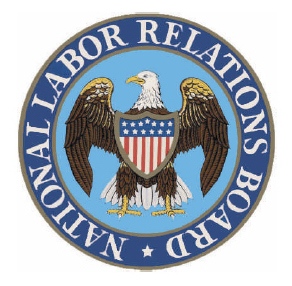
The Board’s membership now consists of three Democrats – Board Chair McFerran (whose current term expires on December 16, 2024), Member David M. Prouty (whose term expires on August 27, 2026), and Member Wilcox. Currently, Marvin E. Kaplan (whose term expires on August 27, 2025) is the sole Republican Member on the Board. Republican former Member John F. Ring’s tenure on the Board expired on Friday, December 16, 2022. In our report last week, we noted that President Biden is currently vetting a candidate to replace Ring in that Republican spot.
Wednesday, September 13, 2023: USDOL Announced OMB Had Approved Substantially Increased Wage Payment and Benefit Rates its Revised Davis-Bacon Act Rule Requires
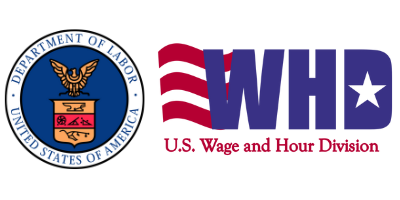
In its notice, the WHD announced that on September 6 OMB approved revisions to an ICR titled, “Requests to Approve Conformed Wage Classifications and Unconventional Fringe Benefit Plans Under the Davis-Bacon and Related Acts and Contract Work Hours and Safety Standards Act.” That ICR was included in the WHD’s Final Rule to update its Davis-Bacon and Related Acts (“DBRA”) regulations published on August 23. The expiration date on this new approval is September 30, 2026.
The Final Rule explains this ICR as follows:
“Regulations at 29 CFR part 5 prescribe labor standards for federally financed and assisted construction contracts subject to the DBA, 40 U.S.C. 3141 et seq., and Related Acts, including all contracts subject to the CWHSSA, 40 U.S.C. 3701, et seq. The DBA and DBRA require payment of locally prevailing wages and fringe benefits, as determined by the Department, to laborers and mechanics on most federally financed or federally assisted construction projects. See 40 U.S.C. 3142(a); 29 CFR 5.5(a)(1). CWHSSA requires the payment of one and one-half times the basic rate of pay for hours worked over 40 in a week on most Federal contracts involving the employment of laborers or mechanics. See 40 U.S.C. 3702(c); 29 CFR 5.5(b)(1).”
Friday, September 15, 2023: New 2023 Disability Awareness Month Video Announced
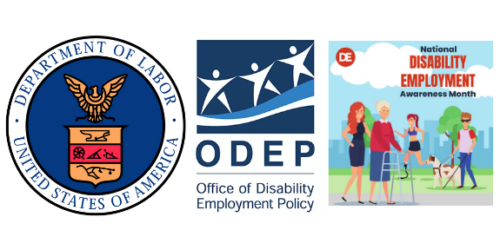
The video is posted on YouTube and ODEP’s NDEAM website, along with the 2023 NDEAM poster, key messages, and social media graphics for individuals and organizations to incorporate into their NDEAM observances.
Looking Ahead:
Upcoming Date Reminders
June 2023: U.S. DOL WHD’s current target date (now overdue) to publish its Final Rule on Nondisplacement of Qualified Workers Under Service Contracts (RIN: 1235-AA42)
June 2023: U.S. OSHA’s current target date (now overdue) to publish its Final Rule on Occupational Exposure to COVID-19 in Healthcare Settings (RIN: 1218-AD36)
August 2023: U.S. DOL WHD’s (now overdue) target date for its Final Rule on Employee or Independent Contractor Classification Under the Fair Labor Standards Act (RIN: 1235-AA43)
August 2023: U.S. NLRB’s (now overdue) target date for its Final Rule on Standard for Determining Joint-Employer Status (under the NLRA) (RIN: 3142-AA21)
August 2023: U.S. NLRB’s (now overdue) target date for its Final Election Protection Rule (RIN: 3142-AA22)
August 2023: U.S. DOL’s OASAM’s (now overdue) target date to publish Proposed Rule on “Revision of the Regulations Implementing Section 188 of the Workforce Innovation and Opportunity Act (WIOA) to Clarify Nondiscrimination and Equal Opportunity Requirements and Obligations Related to Sex” (RIN: 1291-AA44)
September 19, 2023: Comments due on the Office of Personnel Management’s Proposed Rule – “Recruitment and Selection Through Competitive Examination, and Employment in the Excepted Service (Rule of Many)”
September 30, 2023: 2023 VETS-4212 filing deadline –the reporting cycle began on Tuesday, August 1, 2022
October 2, 2023: Deadline for comments on DHS/ICE’s proposed pilot procedure program & information collection for non-E-Verify participants as to remote I-9 Form document inspections
October 10, 2023: Comments due on EEOC’s Proposed Regulations to Implement the Pregnant Workers Fairness Act
October 10, 2023: Comments due on the EEOC’s proposal to extend – without change – its ADEA/OWBPA third-party waiver & disclosure requirements
October 23, 2023: US DOL’s WHD Final Rule updating Davis-Bacon & Related Acts regulations takes effect
October 30, 2023: Deadline for comments on OSHA’s union-friendly proposal to revise its Worker Walkaround Representative Designation Process
October 31, 2023: Opening Date for EEO-1 Survey Component 1 Data Collection
November 7, 2023: Comments due on U.S. DOL WHD’s proposal to revise its FLSA regulations on the exemptions from minimum wage and overtime pay requirements for executive, administrative, & professional employees
December 5, 2023: Deadline for EEO-1 Survey Component 1 Data Collection
December 26, 2023: NLRB’s Direct Final Rule revising its procedures governing representation elections takes effect
December 29, 2023: Statutory deadline for EEOC regulations to enforce the Pregnant Workers Fairness Act
December 2023: OFCCP’s current target date for its Notice of Proposed Rulemaking to “Modernize” Supply & Service Contractor Regulations (RIN: 1250-AA13)
December 2023: OFCCP’s current target date for its Final Rule on “Technical Amendments” to Update Jurisdictional Thresholds & Remove Gender Assumptive Pronouns (RIN: 1250-AA16)
January 1, 2024: U.S. DOL OSHA’s Final Rule Requiring Covered High-Hazard Industry Employers to Electronically Submit Injury & Illness Records Takes Effect
April 3 – April 5, 2024: DEAMcon24 New Orleans
June 2024: OFCCP’s current target date for its Notice of Proposed Rulemaking to Require Reporting of Subcontractors (RIN: 1250-AA15)
THIS COLUMN IS MEANT TO ASSIST IN A GENERAL UNDERSTANDING OF THE CURRENT LAW AND PRACTICE RELATING TO OFCCP. IT IS NOT TO BE REGARDED AS LEGAL ADVICE. COMPANIES OR INDIVIDUALS WITH PARTICULAR QUESTIONS SHOULD SEEK ADVICE OF COUNSEL.
SUBSCRIBE.
Compliance Alerts
Compliance Tips
Week In Review (WIR)
Subscribe to receive alerts, news and updates on all things related to OFCCP compliance as it applies to federal contractors.
OFCCP Compliance Text Alerts
Get OFCCP compliance alerts on your cell phone. Text the word compliance to 55678 and confirm your subscription. Provider message and data rates may apply.

